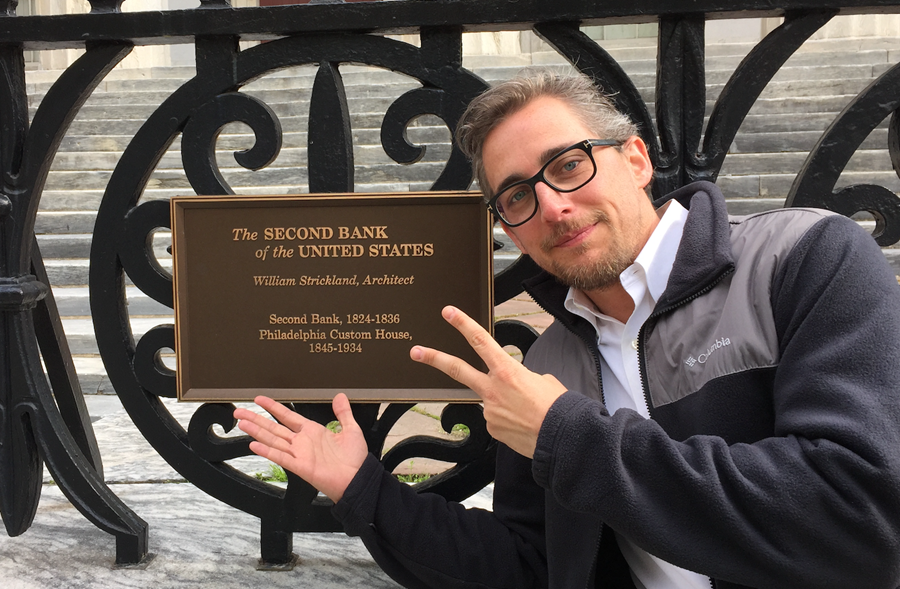These are my notes for the K5M Book Club on the book Money, by Jacob Goldstein.
Chapter 11: Just Don’t Call It a Central Bank
The name Nicholas Biddle seemed familiar to me… where had I heard that name before? OH YEAH! When I was working on my Economic Tourism app!
I was visiting my brother Curt in Philadelphia and there are all these signs about merchants and bankers…

I’m hoping we come back to these two big questions:
- How to do money in a democracy?
- Who gets to print money?
“Congress created a national bank, then killed it twenty years later, then created a second national bank. It was called, reasonably enough, the Second Bank of the United States.”
And yes, I visited that too!

I like the part about Biddle being “the world’s first self-conscious central banker”by thinking about the wider picture and not just the shareholders of his own bank. That seems pretty key to making the whole thing work.

Andrew Jackson
Andrew Jackson seems like an asshole. Not just in the book, but on wikipedia:
- As a young boy, Jackson was easily offended and was considered something of a bully.
- Jackson bought his first slave in 1788 (when he was 21 years old).
- Jackson staunchly defended the rights of Tennesseans against the Indians.
- He chose to align himself with former vice president Aaron Burr. (Burr’s political career ended after the killing of Alexander Hamilton in a duel in 1804.)
- He conquered Florida.
8,370 Kinds of Money
I love this idea. Why is having a lot of kinds of money bad?

An issue of Thompson’s Bank Note Reporter is definitely going on my Christmas wish list!
“The people … demanded that the right to deal in money should be as free in its exercise as that of dealing in wheat or in cotton bales.” YES! 🤑
Free banking reminds me of living in Germany before the Euro. You get paid in US Dollars, and buy everything in Deutsche Marks, and convert those if you go to France or England or whatever. You’re always watching the exchange rates.
Goldstein says it sounds like a nightmare, but that’s just another name for a dream!
And of course you only lose about 1 or 2 percent in all these exchanges, which actually just gives you a 1 or 2 percent incentive to buy locally!
The Federal Government cheated. Rather than create a national currency that had to compete with the other currencies they just taxed them out of business. boo!
Panic Attacks
‘If people know that the central bank will lend to keep their bank in business tomorrow, then they won’t rush to pull their money out today.”
I am not sure that “people” really have a concept of the relationship between central banks and state-chartered banks.
Greed isn’t Good
This part of the book Goldstein says:
“Of course banks are greedy! Of course corporations are selfish, and Wall Street is wily! Blaming a financial crises on these qualities is like a blaming a flood on the wetness of water.”
I’m not sure we should just sit quietly and accept that the system has to be greedy, selfish, and wily. There are alternatives! We’re smart people! This is Goldstein’s lead up to the secret meetings (amazing!) of Senator Aldrich that led to the Federal Reserve Banks which is a story I didn’t know and is very fun, but I’m not buying the premise that we have to accept these negative qualities and try to Tomoe Nage them into a positive place.

An aside: In high school I took a Judo class with Steve Jimerfield, who was the most jacked State Trooper at the Alaska State Trooper Academy where my Dad worked. I was not the best student, but it was fun when I bothered to show up.
One day I went after missing class for a few weeks and got paired with this girl who must have been in junior high. She was a lot smaller than me, but as I was about to find out, much more dedicated to her martial arts.
We were doing some light sparring and she did this move on me and I flew over her and landed hard on my back and then she had me in an arm bar. It was, even from my point of view as the loser, pretty epic. Judo is for real.
